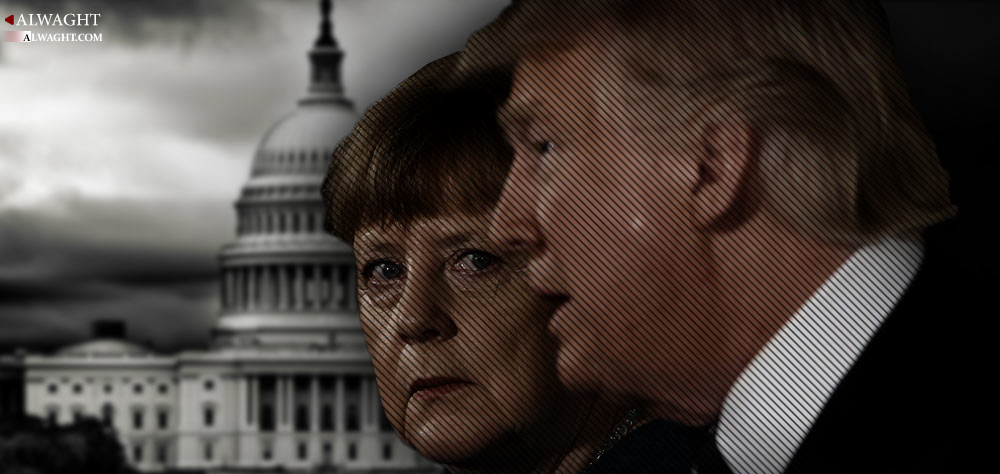Alwaght- White House on Friday hosted a meeting between the American President Donald Trump and the German Chancellor Angela Merkel. Merkel’s visit to the US came a day after the French President Emmanuel Macron visited Washington and discussed with his American counterpart a set of issues. But the German leader’s visit was very different from that of Macron, described by many media outlets as low-key and less warm.
While the American leader very warmly and lavishly received his French counterpart, the case with Merkel was not similar, with signs of coldness giving themselves out very clearly.
The French and German leaders traveled to the US to discuss an array of issues, on top of them Iran nuclear deal. The three-day negotiations of Macron and several-hour talks of Merkel with Trump were supposed to come out with the result that Washington announces commitment to the 2015 deal with Tehran, officially recognized as Joint Comprehensive Plan of Action (JCOPA).
Still what was very attention-grabbing since the very initial moments of Merkel’s entry to the White House was the differences that exposed themselves even before the two leaders officially started their conversation.
Trump bemoans trade deficit with EU
Since the very beginning of Merkel’s arrival, the American President complained about the US negative balance of trade with the European Union, and particularly with Germany, adding that his administration wants fairer business ties with Germans, and this case would make a point of discussion with his guest.
This was not the first time the American leader criticized the trade deficit with Germany. Earlier and when Trump introduced tariffs on the steel and aluminum imported to the country, he directly addressed Berlin, blasting what he called Germany’s domination of the American markets. The real estate mogul complained about the German car and electric industries roaming free in the markets across the US, promising that he would return the job market to the American workers.
But many believe that Trump's announcing trade war against Germany will fire back. Because as much as Washington closes the way of the German products’ entry to the US, Berlin in tit-for-tat responses will restrict the American steel imports to Germany, a dispute never beneficial to the steel industry at the New York Stock Exchange (NYSE).
AS the trade war between the US and China began to loom on the heels of Trump announcing tariffs on China, Germany brought back about 1, 447 tons of gold it deposited in the US Federal Reserve. Berlin declared that it intended to bring back home additional 647 tons of gold by 2020. With this in mind, it was never a surprise that Trump bemoaned the trade difficulty with Berlin upon Merkel’s arrival.
NATO spending is another sticking point
Spending over the foreign operations of the North Atlantic Treaty Organization is another stumbling block between the Americans and the Europeans, and especially the Germans. Trump brazenly expressed unhappiness with his country paying the biggest share in the military organization’s budget, asking the Europeans to pay for a larger share. Trump is recognized as having a mercantilist view of the foreign relations, something negatively impacting Washington’s ties with its closest NATO allies like Germany.
On Saturday, Angela Merkel announced that Berlin will increase its NATO budget share by 1.2 percent. But the news declined to cheer up the American leader because he urged Germany to raise its share by 2 percent. This means that the NATO spending tensions continue between the two.
Berlin tends to flex its muscles to Washington
The Germany-US tensions that apparently played themselves out during Merkel’s trip may ostensibly revolve around business and NATO spending, but the fact is that the states' division is more deep-rooted than it seems. For Germans, it is important to show independence of decision making on the global stage to feed a sense of national pride. This makes them unwilling to fully rely on Washington politically.
During her Friday visit, Merkel said that it has been 70 years since the Second World War ended and Berlin wants to more than ever take independent decisions. The chancellor said that her country is seeking bigger responsibilities across the world and aims to reign its own fate because the post-World War order has come to an end. Such remarks, many analysts agree, questioned the American hegemony globally, exhibiting the idea that Berlin, similar to Moscow, heads to challenge Washington’s unilateralism on the world stage.
Many US-Germany posture gaps in cases such as the nuclear deal with the Islamic Republic of Iran mostly stem from Berlin’s resolution to adopt its own independent foreign policy rather than their conflicting views on the nuclear agreement. This has pushed Americans to review who will be their client in the EU after the British exit from the union. Washington has openly followed a policy to give the European political leadership to France after the Brexit. Opening the space for France to play a role in West Asia, the region of great importance to the US, from the presidency of Nicholas Sarkozy to François Hollande and very extensively to the current president Emmanuel Macron is driven by refreshed White House view of the relationship with Europe. This policy found even bigger favor with Trump. France's participation in airstrikes on the Syrian government’s positions on April 14 bears witness to this reality.
On the opposite side, Germany, which finds US protectionist policies as key to repel the waves of economic crises and rise of right-wing politics across Europe, chooses to adopt confrontational stance towards the US as it observes Washington backs Brexit and scales down trans-Atlantic security cooperation that is supposed to deter an array of troubles the Europeans see ahead.



























